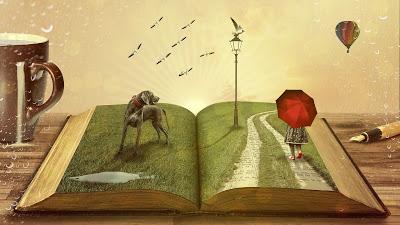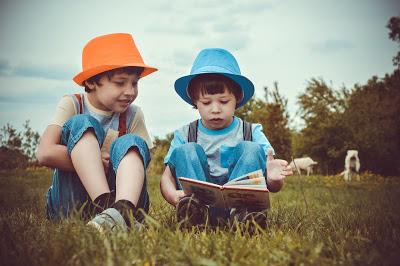 I don't really remember a time when I didn't read. I can remember, quite clearly, the first time I strung together the words in a learn-to-read book with my mom. I remember the elation and sense of accomplishment I had when it dawned on me that those squiggly little letters formed words, which formed sentences, which in turn, formed entire ideas. It was like cracking Enigma. Exhilarating! My fascination with this concept has never diminished. Reading is a wonderful escape into a brave and unknown world, and it has gotten me through many hard spots in my life. Without reading, I would not be who I am today.
I don't really remember a time when I didn't read. I can remember, quite clearly, the first time I strung together the words in a learn-to-read book with my mom. I remember the elation and sense of accomplishment I had when it dawned on me that those squiggly little letters formed words, which formed sentences, which in turn, formed entire ideas. It was like cracking Enigma. Exhilarating! My fascination with this concept has never diminished. Reading is a wonderful escape into a brave and unknown world, and it has gotten me through many hard spots in my life. Without reading, I would not be who I am today. Let's take this a step farther. Without reading, would any of us be where we are today? Lately, I've been spending a lot of time studying libraries. I'm currently finishing my B.A. and one of the topics of an essay that I'm writing is "The Importance of Libraries." I have chosen to focus on how literature affects children in society, and furthermore, why libraries play an important role in it. Reading, as I'm sure you know, has an integral effect on children. The child who reads becomes a child who has a higher chance of achieving not only academic success later in life, but economic success as well. And let's face it: reading a paperback book is different than reading a digital one. In fact, in an article written by Ferris Jabr for the Scientific American, he discusses the influence that the digital world is having on us. "Compared with paper," he says, "screens may also drain more of our mental resources while we are reading and make it a little harder for us to remember what we read when we are done."

Paper books, then, suddenly begin to seem all the more important. Yet this brings us to another point: does this mean we should simply shove literature at our children and expect them to read - and love - the same books that we do? I say no. It is not up to us to force our children to love to read. We shouldn't need to do that. Children will naturally gravitate toward the books they like, and we should allow them to do so without our interference. In fact, it is the child who is an engaged reader - that is, the child who finds reading to be an enjoyable activity - who is even more likely to succeed in other areas later in life. In his well known lecture in 2013 ("Why Our Future Depends on Libraries, Reading, and Daydreaming"), prolific author Neil Gaiman says, "The simplest way to make sure that we raise literate children is to teach them to read, and to show them that reading is a pleasurable activity. And that means, at its simplest, finding books that they enjoy, giving them access to those books, and letting them read." (catch his full speech on YouTube)
This is profound. Over the past 8 or so years, I've found that this concept is startlingly true. I've met with many writing students who, at the beginning of the semester, clearly stated, "I don't like to read. It's boring." By the end of the semester, they will have read over a dozen books in my class! How is that possible? How do we take a child who hates to read and help them see that it can be a wonderful experience? We allow them to read what they want. One of the ways I do this with my students is to first ask them, "What are your favorite movies?" What are the films or hobbies that keep them entranced and fascinated? That is usually a good starting point to help find a genre or category of book that will fit for them. Why are we so concerned with pushing literature at children that is "literary" or "academic?" Truth be told, children don't care. They just want to be entertained. They want to have fun. And it is in the process of reading something that totally captivates them that they begin to learn to process information in a totally new way. They learn to use their imaginations. This is an incredible skill that will come in handy for the rest of their lives. For example, many scientists or cultural leaders grew up reading science fiction! Jane Goodall (a primatologist and founder of the Jane Goodall Institute), told the HuffPost in 2014 that "Three books of my childhood probably had the greatest impact on my life. 'The Story of Doctor Doolittle," and Tarzan of the Apes..." (she later goes on to mention The Miracle of Life as the third book!)

It is clear that those who read are setting themselves up for success later in life. Science Daily reports in this article that "Children who read and write at home - whether for assignments or just for fun - are building long-term study and executive function skills, according to a paper from the University of Washington."
So how does this factor into the importance of brick and mortar libraries? In an increasingly digital world, where children are far more likely to play a game of Plants vs. Zombies on a tablet than hide their nose in a dog-eared paperback copy of Little Women, libraries are a much-needed resource for the children of today. You could say that checking out a paper book from the library is actually a novelty, something a child will delight in. Librarians are there to help guide children toward something that will interest them. It is a communal, societal melding of culture and creativity. Libraries are a center for the arts and for education. They provide access to books - and this is especially important for low-income families who could not otherwise provide literature for their children. Without libraries, how will our children learn to love to read?
The importance of libraries and the influence of literature on young minds is a single issue. They support each other and lend to each other. We must support reading in our children because doing so will set them up for a successful, creative life. We must support our libraries because they can provide our communities with these tools for our children. So today, when you come home from work and your child is clamoring for attention or asking to watch something on television, reach for a book instead. Read aloud (reading aloud is also supremely important for a young, developing mind: it teaches pronunciation, syntax, and broadens the vocabulary). If your child shows interest in reading Harry Potter but you would rather they read 20,000 Leagues Under the Sea, don't deter them! Never mock a child for their interest in a story or genre. It may be different than your tastes, but that doesn't mean that it is wrong. Encourage their reading, always. In doing so, you are molding the next generation of creative world changers.
 All images are royalty free images, sourced from PixaBay.
All images are royalty free images, sourced from PixaBay.
Literature, Libraries, and Little Ones: The Influence of Lit on Young Minds and the Libraries That Support Them

